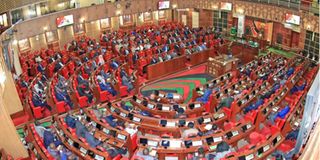Not yet dawn as headlines scream about greed at MPs’ induction sessions

MPs during a past budget reading at Parliament buildings. Our MPs should be formulating legal initiatives that could empower people by channelling resources from the national to the county governments.
What you need to know:
- These MPs really must be high on something if they argue that a salary of Sh710,000 a month is unsuitable for a Member of Parliament.
- The SRC’s decisions are not only sensible but necessary. The Sh380 million or so to be saved annually from this rationalisation is a lot of money if deployed prudently.
- Prudence is what President William Ruto promised during his campaigns and he must now deliver.
The fury and vehemence Members of Parliament exposed this past week when discussing the scrapped Constituency Development Fund and the rationalisation of their monthly emoluments is a clear attestation to the fact that the priorities of those we sent to Parliament are far from being public-centred.
Like their predecessors, they are confirming that our politics is almost entirely transactional and will remain so for the foreseeable future unless the new President (and the losing candidate) force a change of vision and mission at the personal level among their troops in Parliament.
The fury was expected. Immediately the Salaries and Remuneration Commission (SRC) released a slightly trimmed down salary and allowances package for parliamentarians, we knew it was going to trigger a firestorm once the new MPs landed at the National Assembly.
The Supreme Court fanned the expected conflagration when it ruled illegal the Constituency Development Fund that MPs have been using as a carrot and stick to reward or punish areas that voted for or against them.
Decent salary
But the histrionics aside, these MPs really must be high on something if they argue that a salary of Sh710,000 a month is unsuitable for a Member of Parliament.
This is a very decent salary compared to what their counterparts are earning in other jurisdictions. They are angry because a sitting allowance of Sh5,000 per plenary and allowances for committee sitting have been removed.
Mileage allowances were also rationalised to recognise members who actually travel from far-off places as opposed to those that come from Nairobi, Kiambu and other nearby places.
It is the extreme abuse of these allowances that the SRC seeks to tame, as it should.
It also removed a car grant given at the beginning of every parliamentary session and capped the engine capacity against which mileage claims were to be made.
The SRC’s decisions are not only sensible but necessary. The Sh380 million or so to be saved annually from this rationalisation is a lot of money if deployed prudently.
And prudence is what President William Ruto promised during his campaigns and he must now deliver. The Azimio leader also promised disciplined leadership that puts people first.
There is no more powerful affirmation of altruism than demonstrating empathy with the people and doing what is right as a professional.
We want to be silly and imagine that the MPs were serious when they asked for opportunities to serve. This they now have. Are they well compensated? Extremely.
The Kenya National Bureau of Statistics tells us that there are less than 80,000 Kenyans that earn more than Sh100,000 a month or a net of Sh70,000.
The MPs are earning seven times more than these compatriots – without factoring in the regular mileage allowances and the very frequent (and highly lucrative) trips around and outside the country.
That person earning Sh70,000 (regarded as highly paid) is not spared the many demands that the MPs claim they have to shoulder by being MPs.
Kenya’s social networks require that we contribute to virtually everything, from baby showers to weddings to funerals and everything in between.
Driving a car condemns one to being a village ATM. But, and this is important, people have learnt to say No. MPs can and must learn to help people stand on their feet and not expect handouts.
Not many are doing this because they enjoy the relative power dynamics of a patron-client nature that permanently makes one subservient and dilutes the sense of responsibility that the MP should bear to help create an environment that frees the client from the purgatory of hopelessness.
Were it not illegal, I would support retaining the CDF because it provides the resources that if used well can help youth, women’s groups, people with disability, local saving initiatives (chamas), etc., and other organised groups access direct resources or funded opportunities (including training) that could uplift their lives.
Eliminate dependency
Our MPs should be formulating legal initiatives that could empower people by channelling resources from the national to the county governments.
Ways in which the CDF issue can be revisited and properly legislated. How they can work with county structures to ensure equitable development across counties, etc.
This is the way to eliminate the dependency that gives MPs excuses to seek to extract public money for personal use.
MPs must know that they are not going to bribe poverty out of the lives of Kenyans, even if their salaries were multiplied by a factor of five.
They were elected to behave and think like reasonably educated and experienced leaders that can turn this country around under a new hustler tag of a people-centred public service, efficient, frugal, clever and daring.
We were not counting on this demonstration of juvenile petulance and greed, but maybe we counted too soon.
Mr Mshindi, a former Editor-in-Chief of Nation Media Group, is now consulting. [email protected]; @TMshindi)





